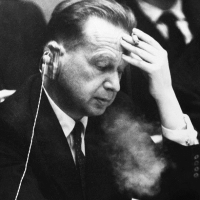UN Asks for NSA Help in Reopening Investigation of 1961 Death of UN Secretary General Dag Hammarskjöld
 Dag Hammarskjöld (AP photo)
Dag Hammarskjöld (AP photo)
Suspicion has lasted for decades over the mysterious crash of the plane carrying the United Nations’ top official more than 50 years ago. A new investigation of the accident says evidence may exist that could prove the aircraft was shot down, and that the U.S. National Security Agency (NSA) could possess some of this evidence.
In September 1961, UN Secretary General Dag Hammarskjöld set out to visit the war-torn Congo to help broker peace between the country’s Soviet-backed government and rebels supported by former colonial power Belgium and Western mining interests.
But the Swedish-born diplomat’s plane never reached its destination of Ndola. It crashed on September 18 into a forest in Northern Rhodesia, now Zambia.
An initial investigation cited pilot error as the cause of the accident, a conclusion rubber stamped by subsequent probes. But many observers suspected foul play.
Now, an international panel of retired judges looking into the incident has recommended that the UN reopen its investigation.
The Hammarskjöld Commission said it had uncovered new findings, and that the NSA might hold crucial evidence supporting the theory that the plane was shot down.
The judges claim a Belgian pilot confessed to firing on the DC6 carrying Hammarskjöld. Additionally, recently interviewed eyewitnesses claim to have seen other aircraft approaching the CD6 and firing on it. A similar account was given by the lone survivor of the crash, an American whose death in a local hospital also raised questions.
In her 2011 book, Who Killed Hammarskjöld?, British academic Susan Williams argues that British authorities covered up Harrarskjöld’s assassination by hardline Belgian colonialists who were angered over UN support for the Congolese government.
Swedish investigator Göran Björkdahl has no doubt the diplomat was murdered. “It's clear there were a lot of circumstances pointing to possible involvement by western powers,” he told The Guardian. “The motive was there – the threat to the west's interests in Congo's huge mineral deposits.”
Because the NSA has long been known to monitor worldwide communications, the agency may have a copy of the radio traffic from September 18-19 that could shed light on what transpired.
“It is a near certainty not only that Ndola’s radio traffic was being monitored routinely by the NSA from Cyprus or elsewhere, but that one or both of the large USAF [United States Air Force] aircraft which had been flown in to Ndola on the crucial night and were parked throughout on the tarmac were there for the specific purpose of monitoring the local radio traffic,” the commission wrote in its report.
To date, the NSA has refused to turn over any documents or recordings sought by the commission, which tried to use the U.S. government’s Freedom of Information Act to request the materials.
-Noel Brinkerhoff
To Learn More:
Dag Hammarskjöld Death: UN 'Should Reopen Inquiry' (BBC News)
Judges Call for Reopening of Inquiry into 1961 Death of UN Chief (by Julian Borger, The Guardian)
Dag Hammarskjöld: Evidence Suggests UN Chief's Plane Was Shot Down (by Julian Borger and Georgina Smith, The Guardian)
- Top Stories
- Unusual News
- Where is the Money Going?
- Controversies
- U.S. and the World
- Appointments and Resignations
- Latest News
- Trump Orders ICE and Border Patrol to Kill More Protestors
- Trump Renames National Football League National Trump League
- Trump to Stop Deportations If…
- Trump Denounces World Series
- What If China Invaded the United States?






Comments